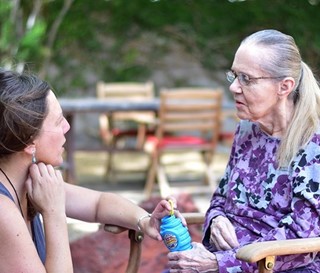Caring for a loved one with Dementia

All of us are most likely affected by dementia—if not directly, then as a family caregiver or friend. It is now the fourth-leading cause of death among Americans age 65 and older. About half of people 85 and older have Alzheimer’s or another form of dementia.

Medical Director Gill Hamilton talks about dementia
How do we support people with dementia and their family caregivers as they cope with a disease that can last a decade or longer? Here’s a quiz we give to medical students:
What do families need to know?
A. Use gentle reality orientation, for example, “No I’m not your mother, I’m your wife.”
B. Speak in a calm but clearly authoritarian voice, for example, “Do not go out that door.”
C. Distract, don’t reality orient or explain.
D. Do not allow them to avoid an activity (such as bathing) as this will make the next time even more difficult.
When I was in medical school, we learned reality orientation: “No, Dad, you’re in Phoenix, not Chicago.” I have seen so many caregivers become frustrated and their loved ones feel demeaned by this method. Far better to “go with the flow.” For example, “Tell me about Chicago, Dad.”
Even if they are heading out a door toward danger, do not confront or try to teach—it doesn’t work. Instead, distract. “Hey, Mom, come look at these pictures!” “Marge, that’s a lovely necklace, come into the light so I can see it better.”
As for bathing, taking medicine, or any other activity they find unpleasant, if you get a negative reaction, stop. Try again later, using gentle instructions. If you say “Dennis, I’m taking you for a shower,” Dennis won’t remember what’s happening when it comes time to take his clothes off. That can be scary. Instead, explain each step. “Dennis, I’m taking off your shirt so you can get clean.” “Dennis, I am turning on the water to help you get clean.” If Dennis still hates it, try a bed bath instead, perhaps washing one area at a time, extended over a day or two. Cover him with a towel—nobody likes being exposed.
What do caregivers need to know?
Caregivers are under tremendous stress and must care for themselves. Mindfulness practice—clearing the mind for 30 minutes a day— can be very beneficial. Mindfulness Based Stress Reduction, an eight-week structured class validated by research, is ideal. Yoga and other movement practices, exercise such as running or walking, spending time in nature, being with friends—are also helpful. These are not selfish activities, but critical to sustain well-being so caregivers can continue to provide excellent care.
Gillian Hamilton, MD, PhD, is director of Palliative Care for Dementia, an in-home program to support and educate caregivers for persons with dementia. Information: 602.636.6363. Contact her at ghamilton@hov.org.
This type of care is ideal for patients who have any stage of Alzheimer's or another type of dementia.
We provide specialized care for those with Alzheimer's or another dementia who are nearing end of life.
Help us continue our mission to provide compassionate care to all by making a donation to our dementia programs.
